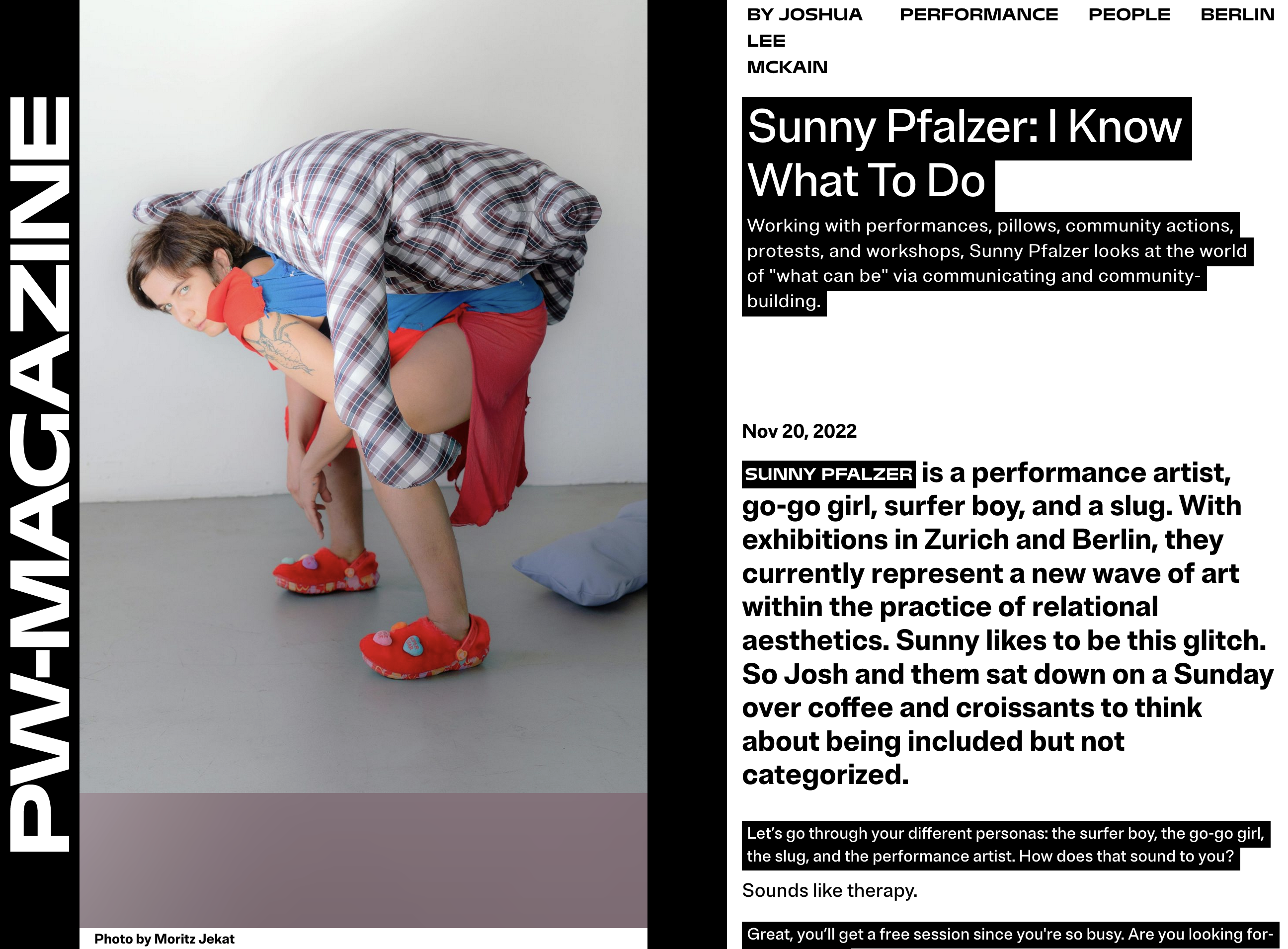
Interview with PW Magazine 2022
Pogo Bar: SUNNY 4 POGO TV, 2020 from KW Institute for Contemporary Art Berlin
“If I disappear, I am with them
Hidden matters reveal themselves
Let’s spam the grey areas between the local
And the global with translation errors”
- Excerpt from “Las Trenzas”, 2017-2018
Hidden matters reveal themselves
Let’s spam the grey areas between the local
And the global with translation errors”
- Excerpt from “Las Trenzas”, 2017-2018
TEXT BY STEPHANIE HOLL-TRIEU
Between two bodies lies a boundary, an interface. Here we find the surface onto which Sunny Pfalzer projects poetry, performance and occasionally (finger) porn. Unfurling from the skein of lived experience, she creates braids across her activist background, artistic research into history and politics, as well as popular visual culture. In her work borders don’t stagnate, they wobble and shift, revealing that the binary registers of author vs. reader, performer vs. audience, the private vs. the public have always been unstable. We can rewind this thread from her contribution in Soft Politics(Project Space Festival Berlin, 2019) to their graduation piece Wir befinden uns nicht - Can a text be a performance? (Academy of Fine Arts Vienna, 2016) all the way back to one of her early works No Cover / No Cubrir (collaboration with Sergio Valenzuela, 2014). By sliding between the macroscale of architecture and the nanoscale of bodily gesture, Sunny repositions the body in its environment, immediate and unabridged.
As a member of the Viennese anti-fascist feminist group “Burschenschaft Hysteria” they learned to prod, provoke and puncture the infectious ulcers of the far right. By releasing the social body in pain from steeping pools of phlegm and bile, they developed activist tools as integral part to her artistic practice. For them, activism does not stand in contradistinction to art, or art to activism. They are one bicephalous creature, fierce and cute at once. In Mexico City they used these tools to initiate the group Las Trenzas (trans. “The Braids”), a gang of hooligan-cheerleader hybrids, revived superheroes arriving from the dark depths of outer space to crash your subway commute. Occupying the public transportation system of Mexico for five hours, these sci-fi heroes were encountered chanting a feminist manifesto. Extending poetic vibrations across underground non-places, rerouting them around scurrying bodies, the performance rehearsed incantations to move differently through public space. What happens when eyes lock for more than just a second? Or feet move sideways, skirting the usual pathways across the platform? What if we moved by the ruse of our hips rather than our heavy head, and if our forearms touched the ground just as often as the soles of our feet?
The virtual xeno-gang is a queer attack on reality, when reality is declined in the singular. It is a crucible, an alchemic contraption to concoct the inscription of virtual realities. Rather than a fixed format, it materialises by appropriation: The workshop-intervention Gangs of performative Activism (2019-ongoing) harnesses the research into performative strategies of activist groups to incubate new prototypes of cheerligans and hooleaders. As irritants reddening and tearing up the eyes of social convention, they form collective identities, communal bodies, just as strong as they are fragile.
When Sunny performs in their Moderation / Interventions, she shows that fragility is not necessarily undesirable. Instead, precariousness is the result of mutual dependency. It’s where you and I abut, where we form lumpy knots and torsioned springs; where we’re coiled up in our shared conditions and collective struggles. Weaving together the historical sediments of the specific site in which Sunny performs, she recalls communal and personal histories, fictional or real, traumatic or healing. One can think of memories as containers of energy and information, released at times to speculate on other forms of politics. These may be whimsical as they may be sober, flirtatious, hopelessly romantic, naively idealistic, tender and grieving. It is here, where Sunny’s practice is a most lucid paean to feminist politics, in that they lays bare how the personal has always been political.